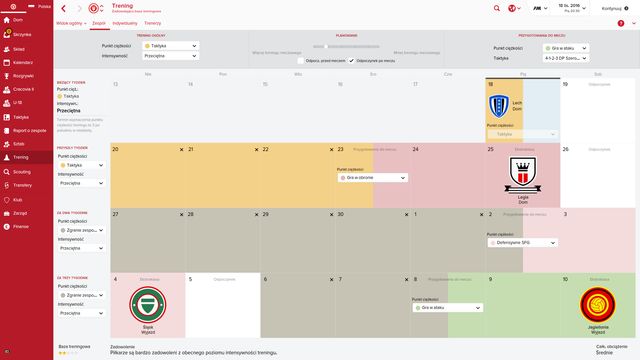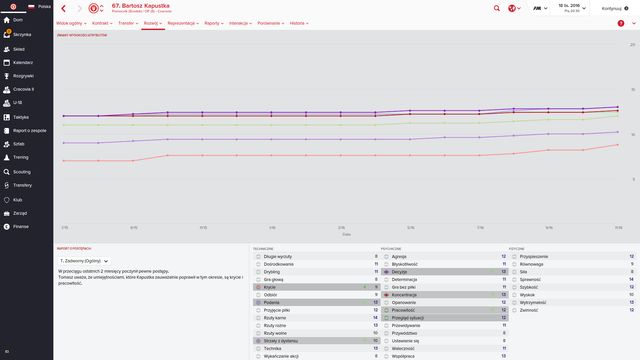Football Manager 2016: Team training

Team training is time that your entire team spends on training a specific aspect. This type of training also encompasses match preparation training that is a part of overall training. The "Planning" slider lets you choose time that you divide between general training and match preparation training. Also, you can specify when players can rest (it is important that they rest, at least, after the match, not necessarily before). Differences between general training and match preparation training concern time devoted to training specific attributes - in the case of the latter, the increase is temporary and it only concerns the forthcoming match. This means that you can (and you should) modify time devoted to match preparation training and increase the amount of work put into this aspect, for example, in the case of an important tournament match that you want to get prepared for as well as possible. On the other hand, remember that this is done at the cost of the overall training and decreases the rate of growth of attributes, in a long run.
Intensity level
It is on the focus that attributes trained will depend. This does not mean that the rest of the attributes will not be trained - intensity is about selecting the aspect that the training is to be focused on in particular.
Flexible - does not focus on any specific aspect.
Fitness - improves on players' fitness of players.
Tactic - improves psychological properties responsible for better deployment and movement on the field, teamwork (e.g. Decisions, Concentration, Teamwork)
Ball possession - improves on the player's technical skills (Technique, Dribbling, Head play, Tackling).
Defense - improves skills connected with playing in defence.
Attacking - improves skills connected with playing in offence.
Teamwork - this training focuses not on developing attributes, but on improving communication within team, their understanding and, as a result, their cohesion, which results in a better, more fluent performance.

By selecting the focus of the training, you should match it with the preferred playing style. For example:
- counter play - you could improve on defensive play and fitness,
- offensive attitude - improve the offensive play, fitness and ball possession,
- high ball possession - focus on ball control,
- physical superiority - increase workload towards fitness and offensive play.
Training intensity
Training intensity that you set affects how much work players must perform during the training. The intensity level can be changed for every coming week. It is a good idea to decrease it, if you play, e.g. two matches within one week. Try to set the intensity of training so that players are loaded with training as much as possible, while remaining happy with the regime. Thanks to this, you make sure that their attributes will be properly developed and players will not be overburdened. In the case, in which only several players are unhappy with training intensity being too high, consider decreasing it for them only, in individual training. The more high-intensity coaching at the cost of match preparation coaching you do, the better the outcome. However, do not over do because high intensity may lead to drastic drip in the players' fitness and their contentment and raise the intensity just enough not to disturb the current state of affairs.
Season preparatory match
After your players return from their vacations, you notice that their fitness ha dropped considerably. Use the break before season matches to play friendly matches, also implement appropriate coaching to raise their Teamwork and Fitness. Do not hesitate to set higher than usual intensity and work on fitness as much as you can. As soon as it goes up sufficiently high, increase your focus on Teamwork, which is especially important when you change your tactic and after new transfers. At the same time, you should limit intensity of match preparation training sessions and focus on restoring the players to their fitness as quickly as possible. Only after they work well together and fit, focus on the next aspects preferred by you.
Match preparation training
During match preparation training, you can focus on six individual aspects:
Match Tactics - players spend time on perfecting tactic. This type of training increases their knowledge about tactic (up to three tactics at any given moment) and this effect accumulates with the one provided by the general training. It is recommended that you get prepared in this respect, up until you attain maximum familiarity with the tactic.
Teamwork - players spend time on perfecting teamwork, which ensures better communication between players in the field. Training this aspect accumulates, at the same time, with teamwork general training. Just like in the case of tactic, it is recommended that you train this aspect up until you attain maximum familiarity with it.
Defensive Positioning - improves on defensive skills, a temporary effect.
Attacking Movement - improves on offensive skills, a temporary effect.
Defending set pieces - allows your players to take better actions during game's set pieces. It is useful in situations in which you, e.g. lose many goals after corner kicks an the opponent has players with strong head play.
Attacking Set Pieces - allows your players to train actions during set pieces in attack.
While selecting the aspect to train, you can use suggestions made by your staff and report prepared by the club's scout.
How to divide time?
There is no point in overdoing with the match preparation training, so that you do not distort the general training that provides you with long-term effects. However, you cannot ignore this aspect, because it lets you work on select attributes of the players and improve on their play before individual matches. If your teamwork and tactic familiarity are low, you should devote the match preparation training to those aspects. After they reach their maximum, focus on offensive, or defensive preparations, which depends on the type of the opponent that you are going to play against. You can then decrease amount of time devoted to match preparation training, e.g. to one half of the day. Also, it is possible to skip match preparation training, in situation in which you believe you do not need additional preparing for the match. Thanks to this, you will be able to allot more time to general training.
During the week in which you play two, or even three matches, you can focus on match preparation training only. Remember that your players will have less time to rest, which is why you should consider lowering the intensity of general training. As a counter balance, you can increase the intensity during the week in which you play only one match and players have more time to rest. Try your training plan not to be scheduled rigidly - instead, modify match preparation, keep changing intensity and a lot days off to players, whenever they need that. Reacting to your schedule and modifying training sessions (also when it comes to focus), lets you achieve better effects.
You are not permitted to copy any image, text or info from this page. This site is not associated with and/or endorsed by the developers and the publishers. All logos and images are copyrighted by their respective owners.
Copyright © 2000 - 2025 Webedia Polska SA for gamepressure.com, unofficial game guides, walkthroughs, secrets, game tips, maps & strategies for top games.
